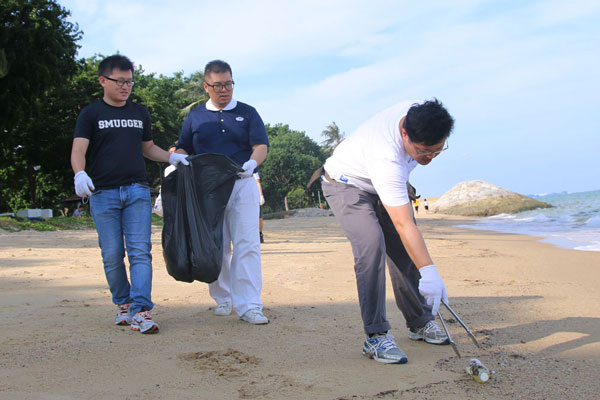
Photo by Chai Yu Leong
“Dear children, do you know what this place is?”
“Eco-Awareness Station!” was the childlike reply.
On 18th March 2017, the Tzu Chi Eco-Awareness Centre warmly welcomed about 80 primary school students from Kong Meng San Dharma School. These lively kids bonded quickly with the Tzu Chi volunteers at the Centre and were lost in joyful experiential learning about the importance of caring for Mother Earth and showing compassion for life.

Photo by Chai Yu Leong
The volunteers kicked off the day’s activities by forming the children into groups of 5 to 7; then they bound each group with a hula hoop and made each group walk back and forth between 5 to 6 metres.
“It’s so tight, how to squeeze inside?” was the natural outcry from one such tightly-bound group.
In the process of the game, some of the shorter children couldn’t even touch the floor after being squeezed into the tight circles, and some fell to the ground as a result of the constant tussle within each group.

Photo by Chai Yu Leong
“How do you feel?” A volunteer asked the children after the game. “It was not easy…” was the consensus among the children. Volunteers explained that the purpose of the game was to enable the children to briefly experience what it feels like to be livestock kept in extremely narrow cages that limit movements, before being slaughtered for human consumption. When asked how to help these animals, one of the children innocently replied, “Eat vegetarian (food)!”

Photo by Chai Yu Leong

Photo by Huang Xue Fen

Photo by Chai Yu Leong
After the activity, the children proceeded to the second floor of the Eco-Awareness Centre, where volunteers played a children’s programme from Da Ai TV, to let the children and their parents understand that humans have not only consumed livestock, but the rearing of animals also produces large quantities of waste that pollute our environment. Shocking data on pollution was revealed through the short video ─ for example, to produce 1kg of beef, 15,500 litres of water are required. Upon hearing that, the kids could not help but respond with a loud “Wah!” throughout the room.
This is the second year that Kong Meng San Dharma School has organized a group visit to the centre. First-time volunteer teacher Shi Yue Ting said, “We are seldom exposed to such videos in our daily lives; coming here can deepen our understanding about the importance of environmental protection. We should start from our daily lives, and cultivate good environmental practices from young, then we will develop environmental awareness as grown-ups.”
Shi Yue Ting was pleased to discover that her house was near to the Eco-Awareness Centre, and expressed an intention to volunteer on weekends when she is free.
“Today I witnessed how the volunteers used simple videos, graphics and games to bring out environmental messages, so that the children could easily absorb the information,” said Teacher in-charge Cai Xiao Juan, to affirm the volunteers’ efforts.
Then, before the children started sorting out the recyclables, they raised both hands to practise Tzu Chi’s “ten-finger mnemonic”, to learn the different categories in which recycled materials can be sorted. After that, everyone worked diligently and sorted the two piles of recycled materials into their respective recycling boxes.

Photo by Chai Yu Leong

Photo by Huang Xue Fen

Photo by Chai Yu Leong
“It’s not difficult for children to play a part in environmental protection,” said parent Zhuo Pei Xian. She had accompanied her daughter to take part in the visit, and further shared that her family has a habit of recycling at home. For example, they collect paper cartons for eggs, plastic yoghurt bottles, newspapers, etc., to be sent for recycling. Her daughter, Long Si Ling also expressed, “It is fun to protect the environment. I learn not to litter, and will go back and share (what I have learned) with my friends.”
Volunteer Tai Nyeok Moi (bottom picture: standing left) said, “The main challenge that we faced in planning and preparing for the programme was the young age of the visiting children. The content needed to be simple to understand and yet attractive enough to capture their attention. We spent a fair bit of time searching and editing suitable video clips, as well as designing games related to promoting vegetarian diet.”
Witnessing the enthusiastic responses from the children, Dai hoped that more children would come in the future to learn about environmental protection; even though the process of planning the programme was not easy, it was worth the effort. She added, “Our future depends on these little children. Through experiential learning, the seeds of environmental protection can take root in their young minds, and one day bear fruit in their daily lives.”

Photo by Chai Yu Leong



